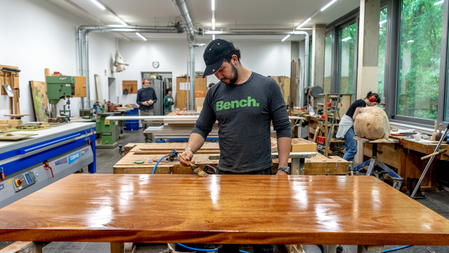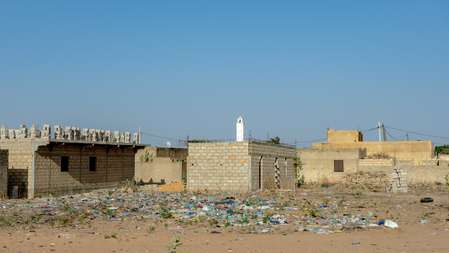Plastic recycling start-up in Senegal
Product designer Johannes Kastner wants to set up a recycling workshop in Senegal to reduce plastic waste.
Vast amounts of plastic waste represent a classic case of global environmental pollution. Up to 13 million tons of plastic waste end up in the oceans from land every year. For Johannes Kastner, an art school graduate, efforts to curb plastic waste are moving too slowly: "I find the movements around the issues of plastic waste reduction and more recycling to be sluggish. Especially in the global south, the disastrous consequences of failed environmental policies are becoming apparent," the graduate said. Building on this, he sought in his thesis on "Open Plastic Recycling in the Global South. Testing a new manufacturing method in Senegal, Dakar" for application-oriented approaches to solutions.
In May 2022 - during a study trip in Senegal, Dakar - Kastner met artisans:inside through the project "DesignUp", with whom he produced three recycled stools. "High-quality plastic waste can be easily recycled to effectively combat increasing plastic pollution," the designer explains. Together with Senegalese Sally Wayne, Kastner developed the start-up idea to produce high-quality furniture from recycled plastic for the African market. "Our focus is on recycling plastic waste in urban areas, for which my thesis will apply results from injection molding technology," Kastner says. To manufacture new products using injection molding, molds are usually needed that are milled from a metal block. This manufacturing process is very costly and time-consuming. To optimize this process, Kastner proposes to work with recycled concrete. The molds made from recycled concrete are more sustainable and can be produced anywhere at a lower cost. "This manufacturing process also makes small-batch production possible, which was not feasible before," says the product designer.
Kastner successfully completed his product design degree in the summer of 2023. He will travel to Senegal for six months in the fall to realize his start-up idea. As part of his recycling workshop, he would like to promote cooperation with regional suppliers. At the same time, networking is very important to him: "In Dakar, I would like to work with the Goethe-Institut, with the university and with the craftsmen," emphasizes the product designer. "My goal is that the workshop will eventually be self-supporting and that I will be involved as a designer from Germany. But the challenge will first be to create a basic framework for the workshop within six months," says Kastner.
For Kastner, there is no idealized end state in design. He wants to develop approaches to sustainable product design and open them up for discussion and further development. "I'm not a know-it-all who improves the world with his approach to design and technology," Kastner expresses. That's why, for example in Dakar, what's important to him is "working with the local people who live there and know best about the problems and challenges in their own country!"
From 2016 to 2023, Kastner studied at the Kunsthochschule Kassel (majoring in industrial design). During his studies, he spent a semester abroad at the Zurich University of the Arts in Zurich, Switzerland. In 2022, Kastner was awarded the special prize "Social Entrepreneurship" at the Unikat Ideas Competition for his project "Profil-System" - development of tools for waste recycling. With the Unikat Ideas Competition, the University of Kassel honors novel product and business ideas that come from the university.
(Text in German: Çiğdem Özdemir)


